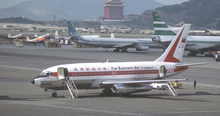Far Eastern Air Transport Flight 103
Far Eastern Air Transport Flight 103 was a flight from Taiwan Taipei Songshan Airport to Kaohsiung International Airport that crashed on 22 August 1981, killing all 110 people on board. The Boeing 737-222 aircraft disintegrated in mid-air and crashed in Sanyi Township Miaoli County mountain Village double pit area. It is also called the Sanyi Air Disaster. The crash is the second-deadliest aviation accident on Taiwanese soil, behind China Airlines Flight 676.[1]
 A Far Eastern Air Transport Boeing 737-200 similar to the one involved | |
| Accident | |
|---|---|
| Date | 22 August 1981 |
| Summary | Metal fatigue cracking and severe corrosion, leading to explosive decompression and in-flight break-up |
| Site | Near Sanyi Township, Miaoli County, Taiwan |
| Aircraft | |
| Aircraft type | Boeing 737-222 |
| Operator | Far Eastern Air Transport |
| IATA flight No. | FE103 |
| ICAO flight No. | FEA103 |
| Call sign | FAR EASTERN 103 |
| Registration | B-2603 |
| Flight origin | Taipei Songshan Airport |
| Destination | Kaohsiung International Airport |
| Occupants | 110 |
| Passengers | 102 |
| Crew | 8 |
| Fatalities | 110 |
| Survivors | 0 |
Aircraft
- Aircraft model: Boeing 737-222
- Manufacturing serial number (msn): 19939/151
- Registration: B-2603 (ex United Airlines N9058U)
- Year of manufacture: 1969
Summary
The aircraft had previously lost cabin pressure on 5 August; and earlier on the day of the crash it had departed Songshan Airport but the crew aborted the flight ten minutes later for the same reason. After repairs were made the aircraft departed Songshan Airport again bound for Kaohsiung International Airport. 14 minutes after take-off, the aircraft suffered an explosive decompression and disintegrated. The wreckage was scattered across an area of 4 miles (6 km) located some 94 miles (151 km) south of Taipei. The nose crashed in Sanyi Township, Miaoli County. Other debris crashed in Yuanli Township, Tongluo Township and Tongxiao Township . All 110 passengers and crew died.[2] After the accident, due to the area being in mountainous region, road traffic was backed up. The remains of the victims were transported by road to the Shengxing railway station and from there they were transported by train.[3]
Cause
Although there was early speculation that the crash was caused by an explosive device, an investigation by the Republic of China Civil Aeronautics Board concluded that severe corrosion led to a pressure hull rupture. The severe corrosion was due to the many pressurization flight cycles the aircraft had experienced, and that cracks produced were probably undetected.[1]
Aftermath
After the crash, Far Eastern Air Transport discontinued flight numbers 103 and 104 (also involved in an accident); although they were resumed some time after, but in September 2007 the airline discontinued their use again, due to the Taiwan High Speed Rail traffic's impact on the Taipei - Kaohsiung route.
Victims
| Nationality | Passengers | Crew | Total |
|---|---|---|---|
| Taiwan | 82 | 8 | 90 |
| Japan | 18 | 0 | 18 |
| United States | 2 | 0 | 2 |
| Total | 102 | 8 | 110 |
Notable victims
References
- Ranter, Harro. "ASN Aircraft accident Boeing 737-222 B-2603 Miao-Li". aviation-safety.net. Retrieved 24 July 2018.
- "AIRLINER THAT CRASHED IN TAIWAN, KILLING 110, HAD PRESSURE SNAGS." Associated Press at The New York Times. Sunday 23 August 1981. Late City Final Edition, Section 1, Page 3, Column 1. Retrieved on 6 January 2012.
- "U.S. Experts to Probe Crash." Associated Press at the Sarasota Herald-Tribune. Sunday 30 August 1981. 3A. Retrieved on 6 January 2012.
External links
- Aviation Safety Network
- Airliners.net Photos of the airline
- Reviewing the voyage of Sanyi Air Disaster - Taiwan TV reporter Zhang Jizheng
- UK CAA Document CAA 429 World Airline Accident Summary (ICAO Summary 4/76)